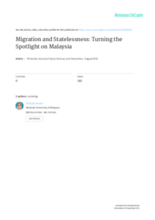The writers describe statelessness as the concept of “reverse nationality.” Statelessness can occur when a child is born in a country that subscribes to the jus sanguinis principle. It can also happen when one tries to renounce his or her nationality. Women who marry foreign men sometimes lose their nationality. Another potential cause of statelessness could be territorial changes. The article points out no matter the cause, the consequences could be grave. Stateless persons could lose basic human rights due to their statelessness.
In regard to refugees and statelessness, the article remarks that in order for asylum seekers to be considered refugees, they must be able to satisfy the criteria of a refugee under the 1951 Convention Relating to the Status of Refugees. The article reviews the example of Filipino migrants entry into East Malaysia, which increased during the rule of President Marcos in 1970s. These migrants were considered refugees. Since there was a treaty agreement in the Philippines, the reason for migration has changed. As such Filipino refugees are excluded from the UNHCR Kuala Lumpur Factsheet on Refugees.
The article further states that historically as issues pertain to protection, refugees and stateless persons were thought to be beneficiaries in common. Today in Malaysia, stateless refugees must counter the fact that Malaysia has no legal or administrative framework in place to provide legal protection.
As regards to children, the article notes that in Southeast Asia, two categories of children are at a particularly heightened risk of statelessness: children of migrants who reside in countries of jus sanguinis and children of migrants who reside in states with poor or defective registration systems. Additionally, while there is a universal right of birth registration, there is not a universal right to acquire a nationality for a child. The article notes that in Malaysia, children of undocumented immigrants are designated as undocumented by virtue of their parents. The article further notes that in Sabah, the children of irregular migrants do not generally possess identity documents such as passports. The article states the fundamental issue for children such as these is whether they will be considered by the governments of Indonesia and the Philippines.
The article points out the underlying challenges facing Malaysia. It states that a complete assessment of international standards on the subject may not be realistic in this instance. Malaysia has acceded to relative conventions and treaties in this area including CRC and CEDAW. It further points out that Malaysia has a long standing history of avoiding human rights law.

